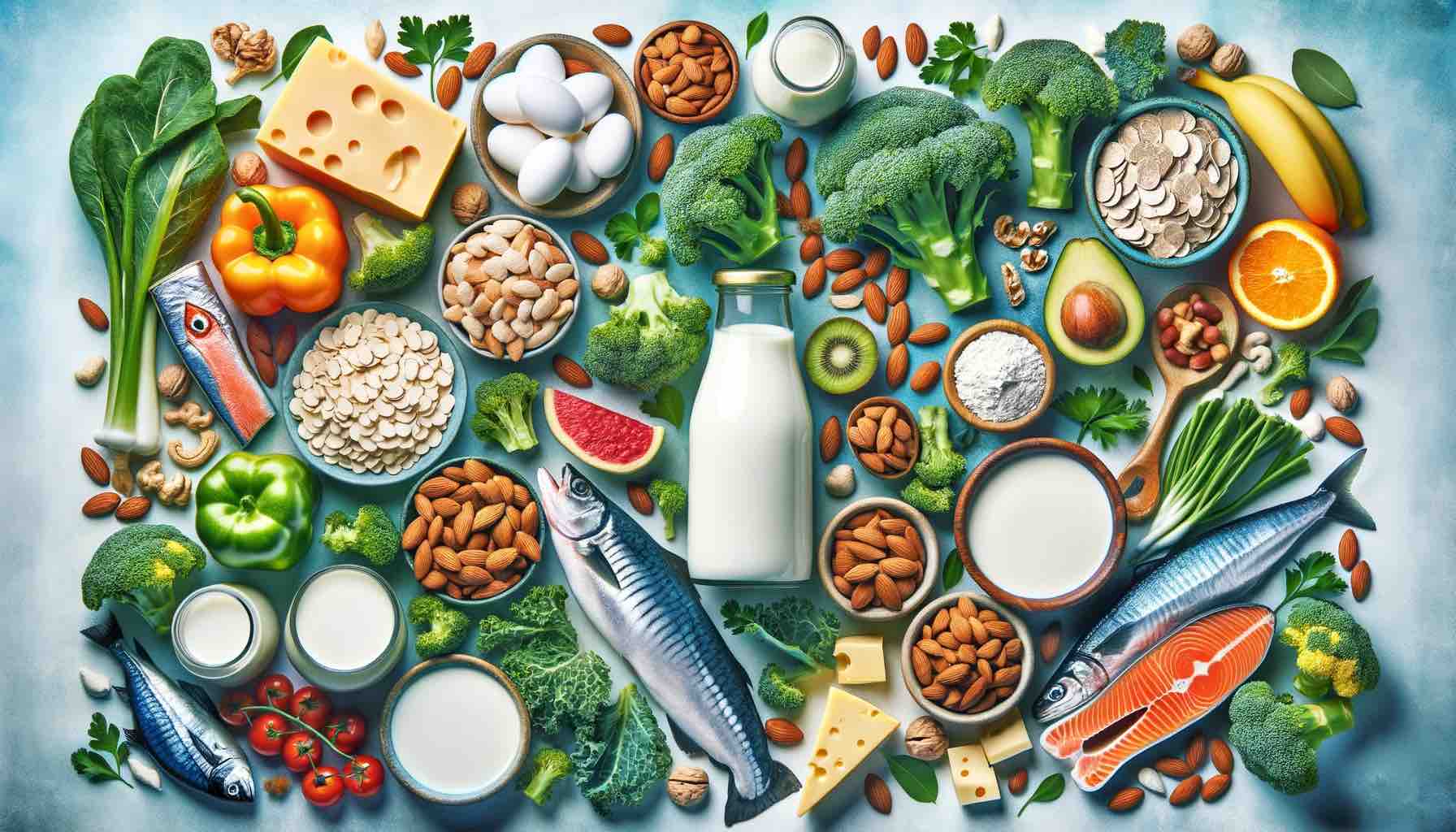
Introduction
Calcium is often touted for its critical role in bone health, but its influence extends far beyond. It’s a mineral that’s essential at every stage of life, playing diverse roles in various bodily functions. This comprehensive guide delves deep into the world of calcium, exploring its importance, sources, daily requirements, and the delicate balance required for optimal health.
Unveiling Calcium: A Vital Mineral for Life
Diverse Roles of Calcium in the Human Body
- Bone Health and Density: Calcium is synonymous with bone health. It forms the backbone (quite literally) of skeletal strength and integrity.
- Muscle Functionality: It enables muscle contraction, including that of the heart, making it crucial for heart health and physical movement.
- Nerve Communication: Calcium ions facilitate the transmission of messages between the brain and every part of the body.
- Blood Clotting: It plays a pivotal role in the blood coagulation cascade, a complex process essential for healing wounds.
- Hormonal Secretion and Enzyme Function: Calcium assists in the secretion of essential hormones and the function of various enzymes within the body.
- Cellular Operations: It’s involved in cell division and signaling, crucial for maintaining healthy tissues and organs.
Rich Sources of Calcium: Beyond Dairy
Exploring Diverse Dietary Options
- Dairy Delights: Milk, cheese, yogurt, and other dairy products are the most recognized sources of calcium.
- Leafy Greens: Vegetables like kale, broccoli, and bok choy offer plant-based calcium options.
- Fortified Choices: Many non-dairy milks, juices, and cereals are fortified with calcium, providing alternatives for vegans and lactose-intolerant individuals.
- Fish and Seafood: Canned sardines and salmon, with their bones, are excellent sources.
- Nuts and Seeds: Almonds, Brazil nuts, and sesame seeds are not just tasty but also calcium-rich.
- Legumes and Grains: Beans, lentils, and certain whole grains contribute to calcium intake.
Navigating the Calcium Maze: How Much Do You Really Need?
Understanding Daily Calcium Requirements
- The recommended intake of calcium varies across age groups, with increased requirements in adolescence, during pregnancy, and post-menopause. For most adults, the daily recommendation is around 1,000 mg, but this can rise up to 1,200 mg for older adults.
The Invisible Threat: Calcium Deficiency and Its Impacts
Decoding the Signs and Risks
- Osteoporosis and Bone Fractures: Chronic calcium deficiency can lead to decreased bone density, increasing the risk of fractures.
- Muscular Symptoms: Muscle aches, cramps, and spasms can be signs of inadequate calcium.
- Neurological Disturbances: Severe deficiency may manifest as numbness, tingling in the extremities, and even mental confusion.
- Dental Issues: Teeth also suffer, with increased risks of cavities and tooth decay.
Culprits Behind Calcium Deficiency
- Inadequate dietary intake, age-related changes in absorption, certain medications, and specific medical conditions can all contribute to calcium deficiency.
Too Much of a Good Thing: The Perils of Excessive Calcium
Understanding the Consequences of Overconsumption
- Kidney Stones and Renal Issues: High calcium levels can lead to kidney stones and, in severe cases, kidney failure.
- Cardiovascular Concerns: Excess calcium, especially from supplements, has been linked to heart disease risks.
- Interference with Mineral Absorption: High calcium levels can inhibit the absorption of other minerals like iron and zinc.
Striking the Right Balance: Effective Calcium Management
Practical Tips for Optimal Calcium Consumption
- Dietary Diversity: Emphasize a varied diet that includes multiple calcium sources.
- Mindful Supplementation: Supplements should be used judiciously, under medical guidance, especially for those at risk of osteoporosis.
- Regular Health Checks: Bone density tests and regular medical consultations can help track calcium levels and bone health.
Conclusion: Embracing Calcium for Lifelong Health
The story of calcium in our bodies is one of complexity and crucial importance. It’s not just about drinking more milk or popping supplements; it’s about understanding and managing this vital mineral through a balanced diet and lifestyle choices. From strong bones to a healthy heart, calcium is a key player in the symphony of our bodily functions. Embracing its importance is a step towards sustained health and wellbeing.
FAQs
- How does calcium benefit bone health?
- Calcium is a primary component of bones, providing structural strength and density. Adequate calcium intake is essential for developing and maintaining strong bones and plays a crucial role in preventing osteoporosis.
- Can calcium intake affect cardiovascular health?
- Yes, calcium plays a role in cardiovascular health. While it’s essential for muscle function, including heart muscles, excessive calcium, especially from supplements, has been linked to an increased risk of heart disease.
- Are dairy products the only reliable source of calcium?
- While dairy products are rich in calcium and easily absorbed, they are not the only source. Leafy greens, fortified plant-based milks, nuts, and certain fish also provide calcium, offering various options for different dietary preferences.
- How much calcium should an average adult consume daily?
- The recommended daily intake of calcium for an average adult is generally around 1,000 mg, but this can vary based on age, gender, and life stage, such as during pregnancy or post-menopause.
- What are the signs of calcium deficiency?
- Symptoms of calcium deficiency can include muscle cramps and spasms, numbness and tingling in fingers, fatigue, poor appetite, and in severe cases, confusion or memory loss.
- Is too much calcium harmful?
- Excessive calcium intake, particularly from supplements, can lead to hypercalcemia, which can cause kidney stones, interfere with heart and brain function, and affect the absorption of other minerals.
- Can calcium improve muscle function?
- Yes, calcium is vital for muscle contractions, including the heart muscle. It helps in the smooth functioning of muscular movements and is essential for maintaining muscle health.
- Does calcium intake affect pregnancy?
- Adequate calcium intake is especially important during pregnancy for the health of the mother and the development of the baby’s bones.
- What role does calcium play in nerve transmission?
- Calcium ions are crucial for transmitting signals in the nervous system. They facilitate the release of neurotransmitters, which carry messages from nerve cells to muscles or other nerves.
- How can vegans ensure adequate calcium intake?
- Vegans can obtain calcium from fortified plant-based milks and juices, leafy greens, tofu prepared with calcium sulfate, almonds, and certain legumes and grains.
Blog Tags for the Post:
calcium nutrition, bone health, dairy alternatives, heart health, muscle function, nerve function, calcium in diet, osteoporosis prevention, vegan sources of calcium, pregnancy nutrition












